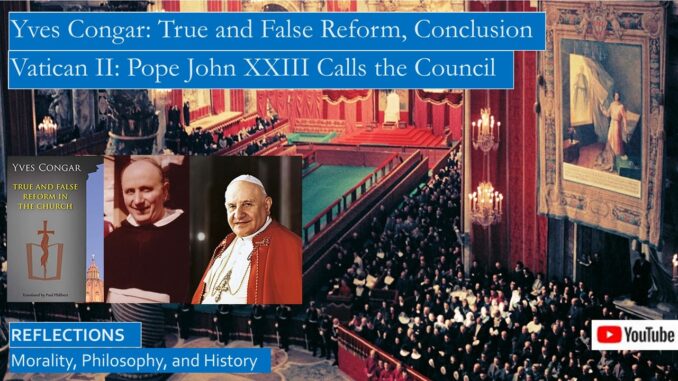
When Archbishop Angelo Roncalli, the future Pope John XXIII, reflected on Yves Congar’s book, True and False Reform, he asked, “A reform of the church? Is such a thing really possible?” When he decided to throw open the windows of the Catholic Church to the modern world by calling the Second Vatican Council, he did so not to denounce errors, but to engage the world in a pastoral and loving manner, mirroring much of what Yves Congar said in this book.
Historically, this urge for reform in the Catholic Church grew out of the experience of believers surviving the hostile fascist regimes of World War II, so we will reflect on a short biography including the wartime experiences of Pope John XXIII.
This video starts with the summarizing conclusion of Yves Congar on True and False Reform. Although this can be viewed as a stand-alone video, we encourage you to view the videos on the first two parts of the book. The first part strives to prepare the way for reform by reflecting on questions such as the nature of the church and her sacraments, how the modern church differs from the ancient church, and that true reform returns us to the ancient traditions of the church.
The second part reflects on why some reformers were truly successful, and why some reformers were divisive. Most importantly, we reflect on how reforms or exhortations should be shared in a pastoral manner rather than hurling anathemas in a condemning tone.
YouTube video for this blog: https://youtu.be/yYp7yFZqc3s
Script for this video, with more Amazon book links: https://www.slideshare.net/BruceStrom1/yves-congar-true-and-false-reform-part-1-finding-common-ground
Part Three: The Reformation and Protestantism: Withdrawn in Final Edition. How can you even define Protestantism?
This section was likely a rather long section in the first version of the book, but after the Second Vatican Council, the third edition dropped this section entirely, leaving only the heading. The decrees of Vatican II did emphasize that the Catholic Church had much to learn from her separated brethren, the Protestants. But Vatican II did abolish the belief that Protestants could not be saved and were subject to damnation if they did not convert to Catholicism.
This section was likely dropped because it would be impossible to write, as there is an endless variety of denominations in Protestantism. Personally, I find it more useful to discuss sacramental Christianity versus evangelical Christianity rather than try to compare Catholicism versus Protestantism. This is also problematic, as the Protestant denominations are on a continuum between sacramentalism and evangelicalism; some denominations, like Methodism, are near the middle.
Conclusion: Perspectives on the Attitude to Take Toward Concrete Reform Initiatives
Quite often the church is not open to reform movements, and this is not all bad, because, as Yves Congar states, “Before all else, the church has to safeguard its very being as well as the integrity of its principles,” as Scriptures exhort, “Guard what has been entrusted to you. (1 Tim 6:20)”
Yves Congar points out remarkable examples, such as Pope Innocent III blessing the efforts of St Francis, and Pope John XXIII opening the windows of the church with the calling of Vatican II. These occasions, and eras like the post-Trent centuries showed an expansion of the church’s mission, and he includes the post-World War I era following the initiatives taken by Pope Pius IX, Pope Leo XIII, and Pope Pius X.
Yves Congar reflects on the ministry of St Francis of Assisi, “we cannot find any criticism of the state of affairs in the church or churchmen in the writings of St Francis. Rather, he expressed a deep respect for the priesthood, the sacraments, and the ceremonies of the church.”
Yves Congar also reflects on the ministry of John Wesley, who “only wanted to be a moral reformer, not a reformer of abuses in the church. If the official Anglican Church had welcomed him rather than victimizing him, he would have never seceded from the church. John Wesley created a Methodist Church because the sclerotic body of the established church couldn’t find room for a purely evangelistic ministry.”
Yves Congar reflects on Luther, who was “violent and irritable. He knows this about himself, but he thought that it was helping his mission and that without it he would not have achieved the work he had to do.” And history does confirm that his take-no-prisoners approach to theology did yield results. Yves Congar continues, “Luther, convinced that he was inspired, thought his impulsiveness and violence were the work of the Holy Spirit. He needed the violence to excite him and stir him up. He himself said that he stirred up his courage by evoking the abominations of the papacy.”[1]
Quick Biography of Pope John XXIII
The future Pope John XXIII was born Angelo Roncalli to sharecropper parents in 1881 in Lombardy, Italy. He was an excellent student, was ordained a priest, and the church, seeing his potential, enrolled him in the best papal colleges, and after graduation he became a professor. He was a jovial priest, with many friends, and a born diplomat, biographers describe him as “benign, patient, full of mercy and goodness.” During World War I he served as an army medic and chaplain.
In the interwar years, Congar and Lubac were caught up in the Modernist crisis, being forbidden to teach and watched closely. Although he was a progressive, Roncalli was luckier, he chose not to be outspoken, so he avoided academic persecution. His sermons criticized aspects of the fascist regime in Italy; some scholars believe that was part of the reason why he was promoted to the diplomatic corps to represent the Vatican in Orthodox Bulgaria. He later was also appointed Apostolic Delegate to Turkey and Greece and ordained as archbishop of Bulgaria. Roncalli was skilled at symbolic gestures to smooth his diplomacy, he allayed suspicions when he hung eastern-style icons and introduced Turkish prayers in the mass held at Istanbul. His outreaches to the Orthodox Church began in this period, and he was involved in the ecumenical movement.
Papen and Hindenburg were elected along with Hitler, they made the fatal mistake of believing they could control and contain Hitler. Paper was estranged from Hitler, which is why Papen was willing to assist Roncalli in his efforts to save the Jews.
The Vatican remained neutral during both World Wars. Roncalli’s close relationship with Franz von Papen, German ambassador to Turkey, helped save the lives of tens of thousands of Jews, Dr Wikipedia lists how these Jews were saved. Some of Papen’s associates had lost their lives in Hitler’s purge, the Night of the Long Knives, Papen resigned as Vice Chancellor and was exiled as ambassador to Turkey. During and after the war Roncalli sought to help POWs of both sides. Shortly before the end of the war he was appointed papal nuncio for France. Many of the French bishops who were suspected of collaborating with the Nazis were forcibly retired, this was a difficult assignment for Roncalli.
These many experiences with the Jewish, Orthodox, Muslim, and secular French communities gave Roncalli a broad-minded view of the modern world. In 1952 he was appointed Patriarch of Venice and was made a cardinal, and in 1958 he was elected Pope John XXIII after the death of the wartime Pope Pius XII. His broad-minded experiences, and the sense that the Catholic Church was out of step with the new world dominated by liberal democracies, led him to call the Second Vatican Council into session.[2]
POPE JOHN XXIII ADDRESS OPENING THE SECOND VATICAN COUNCIL
Now we will reflect on Pope John XXIII opening address for the Second Vatican Council, and the themes it has in common with Yves Congar’s book, True and False Reform.
Pope John Paul XXIII opens his speech with:
“A positive proof of the Catholic Church’s vitality is furnished by every single council held in the long course of the centuries.” “And now the Church must once more reaffirm that teaching authority of hers which never fails but will endure until the end of time.”
This echoes Congar’s sentiments that true reform must rediscover the ancient traditions of the church, that the moral teachings never change, but history itself does change, and the church must change with history.
Informally, when asked who came up with the idea to call the Council, Pope John XXIII always credited the Holy Spirit. In this speech he declares, “The decision to hold an ecumenical council came to Us in the first instance in a sudden flash of inspiration. After he communicated this decision,” “the response was immediate. It was as though some ray of supernatural light had entered the minds of all present: it was reflected in their faces; it shone from their eyes. At once the world was swept by a wave of enthusiasm, and men everywhere began to wait eagerly for the celebration of this Council.”
There was indeed a groundswell of enthusiasm from the bishops about this council, many thought that the Catholic Church was on the wrong side of history. The conservative cardinals in the Curia sought a council that would rubber-stamp the decrees drafted by the Preparatory Commission, but that expectation was quickly dashed when the bishops, when they met in council, enthusiastically debated the decrees, insisting on rewriting most of them from scratch, eagerly attending lectures on the new theology by Yves Congar and Henri de Lubac, and other theologians, including the close associates Joseph Ratzinger and Hans Kung.
Pope John XXIII declared that rather than dwell and be depressed over the many challenges facing the church, that instead there was “A Basis For Optimism.” “Present indications are that the human family is on the threshold of a new era. We must recognize here the hand of God, who, as the years roll by, is ever directing men’s efforts, whether they realize it or not, towards the fulfillment of the inscrutable designs of His providence, wisely arranging everything, even adverse human fortune, for the Church’s good.”
Much of Catholic ecclesiology had developed over the millennia assuming the existence of monarchial Catholic states that would support and promote the Catholic faith, though this ideal had been compromised by events like the French Revolution, which led the church to believe that democracy was the enemy of the church. Then came the unfortunate experience of the Spanish Civil War, where the communists massacred the clergy, which deluded the church into viewing fascism as a friend of the church. The fascist dictator Mussolini, who negotiated the Lateran Treaty with Pope Pius XI establishing Vatican City, was indeed a friend of the church for close to two decades, until he went full Nazi shortly before the start of World War II and started persecuting the Jews. And many French bishops and the Vichy regime officials collaborated with the Nazis. And we know who won the war, the democracies of America and England.
https://youtu.be/LvNynEdZFuM and https://youtu.be/QP9UR8fqfvs and https://youtu.be/ozEioe6yyY8 and https://youtu.be/yYpNrhpmsYw
But many leading Catholic churchmen could not stomach this enthusiasm for democracy and the love of democracies for freedom of religion, their memory was how the French Revolutionaries had executed clerics and confiscated church properties some centuries before. These debates on the Vatican II Decree on Religious Freedom caused a split in the church. The French Cardinal Lefebvre formed the breakaway Society of Pope Pius X, which has since reconciled an uneasy truce.
Perhaps it is with this history in mind that Pope John XXIII, in this speech, says “if we are to achieve God’s purpose in our regard, we have a twofold obligation: as citizens of earth, and as citizens of heaven,” which calls for a “fresh approach.”
Here the jovial optimism of Pope John XXIII shines through, “What is needed at the present time is a new enthusiasm, a new joy and serenity of mind in the unreserved acceptance by all of the entire Christian faith, without forfeiting that accuracy and precision in its presentation which characterized the proceedings of the Council of Trent and the First Vatican Council.”
Specifically, our beloved pope emphasized that the Second Vatican Council would not abrogate the decrees of Tent, but would rather reaffirm the decrees of Trent, and indeed, the Trent decrees are cited often both in the Vatican II Decrees and in the Catholic Catechism.
Pope John XXIII continues, “What is needed, and what everyone imbued with a truly Christian, Catholic and apostolic spirit craves today, is that this doctrine shall be more widely known, more deeply understood, and more penetrating in its effects on men’s moral lives. What is needed is that this certain and immutable doctrine, to which the faithful owe obedience, be studied afresh and reformulated in contemporary terms.”
His speech also mirrors Congar when he speaks of “the right way to suppress errors:” “Human ideologies change. Successive generations give rise to varying errors, and these often vanish as quickly as they came, like mist before the sun.”
“The Church has always opposed these errors, and often condemned them with the utmost severity.” But a new PASTORAL APPROACH is needed. “Today, however, Christ’s Bride prefers the balm of mercy to the arm of severity. She believes that present needs are best served by explaining more fully the purport of her doctrines, rather than by publishing condemnations.” And Vatican II restates much of Catholic doctrine in a pastoral manner, this pastoral approach was a major theme for Congar.
Pope John XXIII reaffirms the personal dignity that is at the heart of the Catholic Social Justice doctrine, “It is more and more widely understood that personal dignity and true self-realization are of vital importance and worth every effort to achieve.” Condemning fascist and communist totalitarianism: “More important still, experience has at long last taught men that physical violence, armed might, and political domination are no help at all in providing a happy solution to the serious problems which affect them.”
The Catholic Church of Pope John XXIII seeks to be “A Loving Mother,” “The great desire, therefore, of the Catholic Church in raising aloft at this Council the torch of truth, is to show herself to the world as the loving mother of all mankind; gentle, patient, and full of tenderness and sympathy for her separated children,” referring to Protestants and Orthodox, and he also reaches out to “members of various non-Christian religions.”
Pope John XXIII ends the speech, “For with the opening of this Council a new day is dawning on the Church, bathing her in radiant splendor. It is yet the dawn, but the sun in its rising has already set our hearts aglow. All around is the fragrance of holiness and joy.”[3]
DISCUSSION OF THE SOURCES
We found True and False Reform to be very readable, but you need some patience and dedication, Yves Congar was not writing for a mass audience, but was writing for fellow priests and academics.
For our biography of Pope John XXIII, we listened to a series of lectures by Learn25, formerly Now You Know Media.
We will also have a video exploring the wartime experiences of the leading theologians in the Second Vatican Council, using as on of our sources, David Kertzer’s books, the Pope and Mussolini, and the Pope at War, which draw from the Vatican archives for Pope Pius XI and XII, among many other sources.
We also have a book review video on our sources for our videos on the history and decrees of Vatican II. https://youtu.be/cuKVG24Bf78
[1] Yves Congar, True and False Reform, translated by Paul Philiobert (Collegeville, Minnesota: Liturgical Press, 2011, 1968), Conclusion, pp.309-325.
[2] Gerard Mannion, Lectures on Pope John XXIII, Learn25/Now You Know Media, 2014 and https://en.wikipedia.org/wiki/Pope_John_XXIII
[3] https://www.catholicculture.org/culture/library/view.cfm?recnum=3233

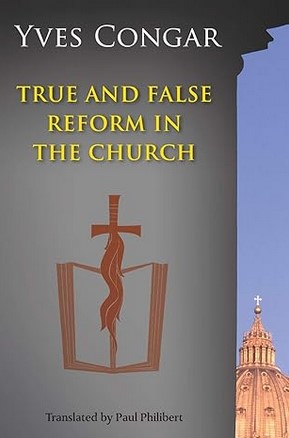
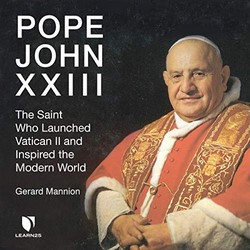
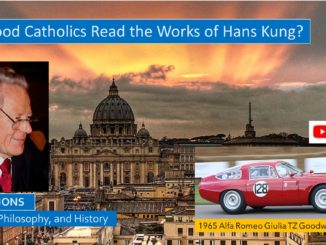
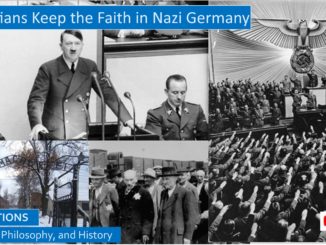
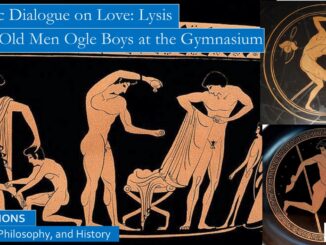
Be the first to comment